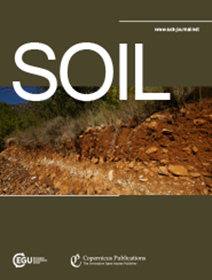为什么土壤的机械理论是至关重要的:另一种支持论点存在,很少在土壤科学中被引用
IF 4.3
2区 农林科学
Q1 SOIL SCIENCE
引用次数: 0
摘要
摘要。在过去的几十年里,对土壤过程的机械、定量描述所做的大量努力已经得到了证明,因为理论和模型帮助我们理解土壤的功能,并预测它们在未来可能如何适应环境变化。物理学家所熟悉的论点是,理论唯一地决定了应该测量什么,但在土壤科学文献中很少被引用。相反,为了对土壤进行分类和绘图,土壤科学家已经并将继续积累大量的“无理论”数据。在这种大背景下,本论坛文章的主要目的是论证积累更多的“无理论”数据,特别是允许人工智能方法的应用,在现阶段是不明智的,并且改进土壤过程理论的发展是至关重要的,为应该执行的测量类型提供指导。希望这篇论坛文章能激发关于这个问题的辩论,并将导致土壤科学理论研究和建模的迫切需要的加强。本文章由计算机程序翻译,如有差异,请以英文原文为准。
Why a mechanistic theory of soils is crucially important: Another line of supportive arguments exists, seldom invoked in soil science
Abstract. In the last few decades, the sizable effort that has been devoted to the mechanistic, quantitative description of soil processes has been justified on the grounds that theories and models help us understand how soils function, and also predict how, e.g., they are likely to adjust in the future to environmental change. The argument, familiar to physicists, that theories uniquely determine what should be measured has rarely if ever been invoked in the soil science literature. On the contrary, to enable the classification and mapping of soil, enormous amounts of “theory-free” data have been and continue to be amassed by soil scientists. In this general context, the key objective of the present Forum article is to argue that the accumulation of more “theory-free” data, in particular to allow the application of artificial intelligence methods, is not sensible at this stage, and that the development of improved theories of soil processes is crucial, to provide guidance about the type of measurements that should be performed. Hopefully, this Forum article will stimulate a debate on this issue, and will lead to a much needed intensification of theoretical research and modelling in soil science.
求助全文
通过发布文献求助,成功后即可免费获取论文全文。
去求助
来源期刊

Soil
Agricultural and Biological Sciences-Soil Science
CiteScore
10.80
自引率
2.90%
发文量
44
审稿时长
30 weeks
期刊介绍:
SOIL is an international scientific journal dedicated to the publication and discussion of high-quality research in the field of soil system sciences.
SOIL is at the interface between the atmosphere, lithosphere, hydrosphere, and biosphere. SOIL publishes scientific research that contributes to understanding the soil system and its interaction with humans and the entire Earth system. The scope of the journal includes all topics that fall within the study of soil science as a discipline, with an emphasis on studies that integrate soil science with other sciences (hydrology, agronomy, socio-economics, health sciences, atmospheric sciences, etc.).
 求助内容:
求助内容: 应助结果提醒方式:
应助结果提醒方式:


